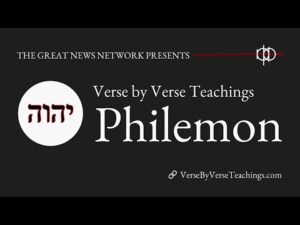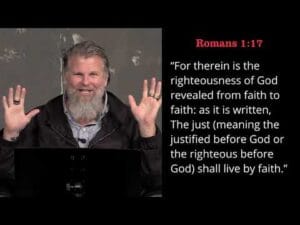
Romans 5:13-15 Bible Teaching
Adam's sin brought death; all inherit sin's environment, not his sin. Christ's death offers grace. Federal Headship: Adam's sin, Christ's grace imputed. Jesus brings life.

Adam's sin brought death; all inherit sin's environment, not his sin. Christ's death offers grace. Federal Headship: Adam's sin, Christ's grace imputed. Jesus brings life.

Yeshua's transfiguration with Moses and Elijah highlights his divine role. Emphasizes faith, prayer, humility, and servanthood. Followers should embody purity and grace.

Shawn's teaching focuses on Yeshua's miracles, compassion, faith, spiritual perception, self-denial, and prioritizing spiritual over worldly interests, emphasizing mercy and spiritual insight.

Romans 5:12: Sin entered through Adam, affecting all; Jesus' justification by faith offers salvation. Emphasizes grace, redemption, and surpassing Adam's sin.

Paul and Shawn emphasize Christ's sacrificial death and reconciliation, urging believers to focus on personal devotion to God, genuine faith, and unconditional love.

The teaching contrasts human traditions with divine commandments, emphasizing internal purity over external rituals. Yeshua's acts of compassion transcend cultural boundaries, highlighting faith and love.

Mark 6: Yeshua rejected in hometown, sends disciples with faith, Herod executes John, feeds 5000, walks on water, emphasizes faith, repentance, spiritual growth.

Paul's Romans 5:6-8 highlights peace with God, tribulation, and hope, introducing human depravity and Christ's love, forming Reformed Theology's TULIP basis.

Shawn's teaching highlights Jesus' authority over Roman spirits, His engagement with Gentiles, and the power of faith in miracles, as seen in healing and resurrection stories.

Justification by faith in Jesus brings eternal peace with God, unlike worldly peace. This peace fosters patience, character, and hope, empowering believers through trials.

Shawn teaches that true adherence to God's commandments comes from internal faith, emphasizing salvation through faith and grace, not law, using Abraham's example.

Shawn teaches Mark 4's parable of the sower, emphasizing varied responses to God's word, YHWH's kingdom growth, and Yeshua's authority over nature.

Jesus heals on the Sabbath, challenges Pharisees, appoints apostles, teaches unity, emphasizes mercy over law, warns against blasphemy of the Holy Spirit, and defines true kinship by faith.

Salvation is a gift of grace received through faith, not by works. Paul contrasts this with works-based systems, emphasizing faith in God for righteousness and freedom from sin.

Shawn's teaching on Mark 2 highlights Jesus' authority to forgive sins, heal, and redefine traditions like the Sabbath, emphasizing a new covenant and continuous rest.

Salvation through faith in Jesus, not the Law; faith upholds moral law, fostering righteousness. Grace encourages rejecting sin, as shown in "Les Miserables." Faith and actions, like love, fulfill God's law. Paul and James agree: faith is proven by love-driven actions, fulfilling commandments to love God and others. Abraham's faith, not works, justified him, showing faith's primacy over legal rites.

Shawn's teaching on Romans 3 explores faith's objective/subjective nature, Christ's propitiation, salvation by faith, nullifying boasting, and grace leading to good works.

Mark's Gospel, written in Rome (56-63 AD), is concise, omits nativity, uses "immediately," tailored for Gentiles, focuses on Yeshua's ministry, healing, and teachings.

Paul's letter to Philemon urges forgiveness and acceptance of Onesimus, a converted slave, as a brother in faith, highlighting reconciliation, love, and spiritual kinship.

Paul teaches that righteousness comes through faith in Jesus, not the law. Justification is by grace, accessible to all. Shawn explains propitiation through Christ's sacrifice.